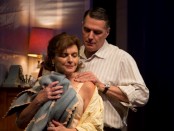The Dance of Death
Clark has chosen to direct the play as though it were drawing room comedy. Beginning and ending the play with a game of cards, there is the suggestion that for Edgar and Alice this is all a series of games. Outsiders cannot understand this, particularly her cousin Kurt who visits them for the first time in 15 years. Whether this is the fault of the new translation or the belief that modern audiences unfamiliar with Strindberg’s psychological nightmares would have trouble sitting through this disturbing ritual, the effect is to make "The Dance of Death" seem very superficial, as though Neil Simon had chosen to rewrite an Eugene O’Neill tragedy simply for laughs. [more]




